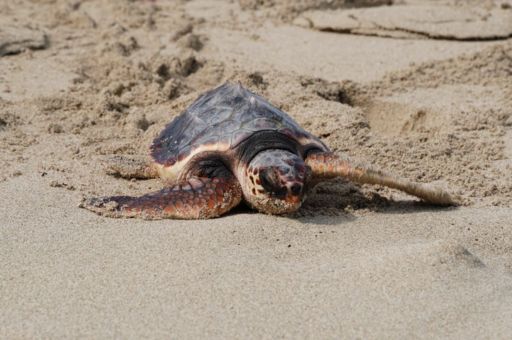The councillor Joan Simonet stressed that the main objective is to inform the public about how to act in the event of finding a specimen of this species, a trace of it in the sand or hatchlings emerging from the nest.
The Regional Ministry of Agriculture, Fisheries and the Natural Environment, through the Consortium for the Recovery of Fauna on the Balearic Islands (COFIB), announced this Wednesday the third edition of the campaign to raise public awareness of the nesting of sea turtles (Caretta caretta), also known as loggerhead turtles, on the Balearic Islands. This programme will begin on 1 June and will remain active until 31 October, as this is the time when sea turtles can nest on the coasts of the western Mediterranean and coincide with a greater presence of people on our beaches.
TDB keeps you informed. Follow us on Facebook, Twitter and Instagram
Natural Environment Department
The councillor for Agriculture, Fisheries and the Natural Environment, Joan Simonet, stressed that developing environmental education actions “is key” for the conservation of the loggerhead turtle, the most common species of sea turtle on our coasts and which is currently classified as “vulnerable”. “The main objective of this new campaign is to inform the population, both locals and visitors, about how to act in the event of finding a turtle, a trace of it in the sand or hatchlings emerging from the nest,” Simonet pointed out. In this regard, the councillor stressed, “it is very important to notify 112 immediately so that technical staff can move to the area quickly. In addition, we must avoid approaching the animal, disturbing it with lights or noise and try to keep the trail of sand intact”.
To spread this message, in 2022 the COFIB’s marine fauna department started this initiative, publishing a sticker with a QR code that links to an explanatory video available in five languages (Catalan, Spanish, English, German and French). These stickers were distributed at different beaches, tourist information points, town halls, ports and yacht clubs, diving centres and tourist establishments throughout the Balearic archipelago. In the summer of 2023, during the second edition, the actions were repeated, but in addition, the Regional Ministry worked more closely with some of the main hotel chains, which chose to become more actively involved. The assessment of the last two years of the campaign is very positive, as more than 3,500 stickers have already been distributed and the video has received more than 14,000 views.
This year, for the third edition of the campaign, the aim is to give continuity to all these actions, to insist on the message of public awareness and responsibility. A series of training sessions have been planned for police officers, lifeguards, technical staff of the town councils of the Balearic coast and companies awarded concessions for beach services (cleaning services, tractors, deckchairs, etc.). In this way, the aim is to focus on the personnel who are most likely to observe a case of nesting. As a novelty, this year the collaboration with tourist information centres and natural parks and protected areas throughout the archipelago will also be reinforced.
The Government will be informed of the nesting cases detected through the social networks of the Ministry of Agriculture, Fisheries and the Natural Environment, where all the data will be updated. Following the state strategy, as has been done in previous years, part of the hatchlings resulting from these nestings will be destined for the Head Starting programme. This method consists of raising the turtles in a controlled environment to release them one year later on the beach of origin, with a size and weight that significantly increase their probability of survival.
Nesting cases in the Balearic Islands
In 2015, the first unsuccessful sea turtle nesting attempt was recorded in Ibiza. In 2019 the first clutch was detected on the same island and the following year, in 2020, two nests were located in Menorca and one in Ibiza. During the summers of 2021 and 2022, however, only two attempts were detected on Formentera. Last summer, in 2023, a total of nine were recorded in the Balearic archipelago. The result was three attempts and six confirmed nests (three in Mallorca and three in Ibiza).
Historically, the sea turtle has nested in the eastern Mediterranean and the western area was considered a feeding ground, but in recent years the number of nestings has increased on our coasts. According to the scientific community, this phenomenon is probably related to climate change and the increase in sea temperature and involves the colonisation of a new breeding area. This is why it is vitally important to draw up conservation plans, carry out research projects and raise public awareness of this species, which is so important in our marine ecosystem.
